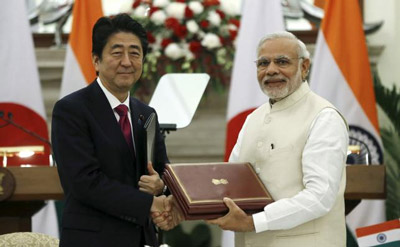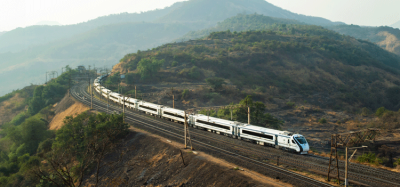India signs high speed rail agreement with Japan
Posted: 14 December 2015 | | No comments yet
India and Japan have signed a Memorandum of Understanding on the proposed Mumbai – Ahmedabad High Speed Rail Project commonly referred to as the Bullet Train project. The governments of India and Japan have signed a Memorandum of Understanding (MoU) on cooperation and assistance of the Mumbai – Ahmedabad High Speed Rail Project and two […]


Prime Minister of Japan, Shinzo Abe and his counterpart Narendra Modi (Image: Reuters)
India and Japan have signed a Memorandum of Understanding on the proposed Mumbai – Ahmedabad High Speed Rail Project commonly referred to as the Bullet Train project.


Prime Minister of Japan, Shinzo Abe and his counterpart Narendra Modi (Image: Reuters)
The governments of India and Japan have signed a Memorandum of Understanding (MoU) on cooperation and assistance of the Mumbai – Ahmedabad High Speed Rail Project and two agreements relating to the upgrade and modernisation of Indian Railways.
The agreed contracts were signed on 12 December 2015 between India’s Prime Minister, Narendra Modi and Prime Minister of Japan, Shinzo Abe, during an official three-day visit to the country. In Memoranda, Japan will provide cooperation and assistance in the form of a $15 billion loan for a 50 year period with a 15-year grace period with an interest rate of 0.1 percent.
Japan to provide $15 billion loan for India’s high speed rail project
The high speed rail project is a 508 kilometre railway line linking the city of Mumbai to Ahmedabad and is planned to be constructed within a seven year period. The agreement also includes the adoption of Shinkansen Technology for the project and Japan’s training of personal for high speed rail.
On 11 December 2015, two agreements were signed between India’s Ministry of Railways and Japan’s Minister of Land, Infrastructure, Transport & Tourism on the modernisation and upgrade of Indian Railways. The agreed cooperation includes:
- Railway Safety;
- Rolling stock including train sets/EMUs;
- Information sharing for station development and land value capture;
- Information sharing for environment friendly sanitation technology in trains
- Signalling and telecommunication;
- Railway Electrification;
- Civil structure and railway track system;
- Train control system;
- Mitigation of natural disasters
Another focus of the MoU was the upgrade of Indian Railways technology through cooperation of the Research Designs and Standards Organization (RDSO) of India and the Japan Railway Technical Research Institute (JRTRI). Upgrades will include improved safety, maintenance and implementation of environment friendly technologies.








